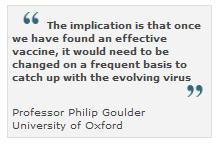H IV is evolving rapidly to escape the human immune system, an international study has shown.
IV is evolving rapidly to escape the human immune system, an international study has shown.
The Nature study highlights just how tough it could be to develop a vaccine that keeps pace with the changing nature of the virus.
The researchers showed HIV was able to adapt rapidly to counter human genes controlling immune system molecules that can target it for destruction.
However, they stressed this would not affect the impact of anti-HIV drugs.
HIV has already killed 25 million people, and an estimated 33 million are currently infected.
However, HIV does not kill all people at the same rate. On average, without treatment it takes 10 years for the infection to progress to Aids, but some people develop the disease within 12 months, while others do not do so for more than 20 years.
 The rate of progress is tied to genes which control production of key immune system molecules called human leucocyte antigens (HLAs).
The rate of progress is tied to genes which control production of key immune system molecules called human leucocyte antigens (HLAs).
Humans differ in the exact HLA genes they have, and even small differences can have a big impact on how quickly Aids develops.
The researchers examined HIV genetic sequences and HLA genes in over 2,800 people in countries, including the UK, Australia, South Africa, Canada and Japan.
'Escape' mutations
They found mutations that enabled HIV effectively to neutralise the effect of a particular HLA gene were more frequent in populations with a high prevalence of that specific gene.
For example, a HLA gene called B*51 is particularly effective at controlling HIV - unless the virus is carrying an "escape" mutation in its genetic make-up.
The researchers found that in Japan, where the B*51 gene is common, two-thirds HIV-positive people without the gene carry HIV armed with the "escape" mutation.
In contrast, in the UK, where the gene is much less common, just 15%-25% of this group of patients are infected with HIV which carries the same key mutation.
Lead researcher Professor Philip Goulder, of the University of Oxford, said similar effects were seen for every HLA gene examined.
He said: "This shows that HIV is extremely adept at adapting to the immune responses in human populations that are most effective at containing the virus.
"This is high speed evolution that we're seeing in the space of just a couple of decades.
"The temptation is to see this as bad news, that these results mean the virus is winning the battle.
"That's not necessarily the case. It could equally be that as the virus changes, different immune responses come into play and are actually more effective.
"The implication is that once we have found an effective vaccine, it would need to be changed on a frequent basis to catch up with the evolving virus, much like we do today with the flu vaccine."
Big challenge
Jo Robinson, of the HIV charity Terrence Higgins Trust, said: "HIV is a complex virus which is constantly changing.
"This kind of research suggests that if we're able to create a vaccine that works against HIV, the virus will always be one step ahead.
"In that case we'd be in a situation where we need to constantly update the HIV vaccine, a bit like we see with a different flu vaccine each year."
Keith Alcorn, of the HIV information service NAM, said: "These findings indicate the enormous challenge involved in developing a vaccine against HIV.
"People need to be aware that the research required to develop a successful vaccine may take decades, during which the virus will continue to evolve, as this research shows."
